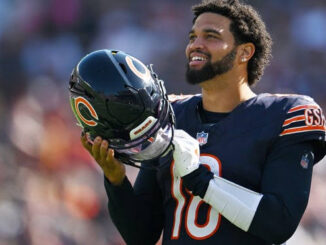DETROIT — About 45 minutes after the Chicago Bears’ 23-20 loss to the Detroit Lions — a game marked by questionable clock management in its final moments — head coach Matt Eberflus addressed the media.
With 36 seconds left and the Bears trailing by three, quarterback Caleb Williams was sacked for a six-yard loss at Detroit’s 41-yard line by Lions defensive end Za’Darius Smith, setting up a daunting 3rd-and-26. The Bears still had a timeout remaining.
Instead of using it, Williams checked into a play as the clock ticked away. His deep incomplete pass to fellow rookie Romeo Odunze ultimately became the game’s final play.
The Lions improved to 11-1, which is a franchise-best start, while the Bears fell to 4-8, leaving questions about their late-game strategy.
“We were there at the end. They had a penalty. We had a penalty. We had a bunch of penalties there — hands in the face,” Eberflus told reporters. “We had — they called a pick route on us — but we also had the (defensive pass interference) put in position, and it is knocking us out of field-goal range, those penalties.
“And then we’re there at second-and-20, take the sack right there. So we’re at 36 seconds right there, and our hope was because it was third going into fourth that we wreck that play at 18 seconds, throw it inbounds, get into the field-goal range, and then call the timeout, and that’s where it was. And that was our decision-making process on that. Again, we were outside the field-goal range, so we needed to get a few more yards in there, as close as we can get, and then we’re going to call timeout, and that’s why we held that last timeout at the end of the game.”
As the clock dipped under 10 seconds, Eberflus held onto the timeout, hoping Williams could run another play. However, once it reached under seven seconds, Eberflus said using the timeout then would have forced the team into a desperation end-zone throw.
“Once it’s 7-12 (seconds), you can’t throw it inside, and it was third going into fourth, so that’s the big deal,” Eberflus said. “So it was third going into fourth. That’s why I wanted to preserve the time.”
About 20 minutes after Eberflus, Williams addressed reporters and explained his perspective on the final moments.
“I’m on the field. I got a call, and I know I took a timeout earlier in — that was the same drive,” Williams said. “I knew I took a timeout earlier, and so I can take a timeout, but in that situation, we had a call. I got the call in and tried to get the guys back, so I focused on making sure everybody gets back, gets lined up.
“I know we don’t have much time left, and so I was trying to get everybody back. We don’t really have — I don’t have a microphone to speak to coach or anything like that, so there wasn’t any huge communication in that situation.”
Williams said that once he got the call and everyone was lined up, he made an adjustment as he watched the clock wind down. In his view, if a catch was completed inbounds, the team wouldn’t have had enough time to set up for a potential game-tying field goal.
Knowing Odunze would be in single coverage, Williams decided to take a shot.
“I mean, we could take a timeout. We got the guys on the field. They’re a big man (coverage) team, and we took a shot,” Williams said. “And with that, you live with it — the right decision. Everybody can, as we always say — and y’all don’t know — but as we always say, you can always hold that clicker and press pause or slow-mo. But the right decision is, if we hit that play, if I hit that play to Rome, it’ll be a different conversation here.
“So the right play isn’t always — you can’t always make the right play. You got to make a decision and go with it.”


Be the first to comment